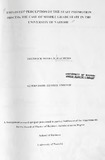| dc.description.abstract | The research used a sample survey design to document the perceptions and the factors that influence the perceptions of middle grade employees on the process of staff promotion in the University of Nairobi. Data was collected from eighty (80) middle grade staff drawn from 8 clusters that represent 8 out of 9 administrative colleges of the University. Of the 80 sampled, 48 (60%) responded.
Data analysis results show that this cadre has a fair gender distribution and a rich academic background with most aged between 40 and 50 and having worked for the University of Nairobi for more than 25 years. Most middle grade employees joined the university in grade A/B/C and are still in those grades. Majority do not agree with the management's decisions on promotion. Research findings indicate that internal advertisements for vacancies in the University are neither effective nor ineffective.
Employees don't receive communications about procedures used in promotions and decisions finally reached. Results indicate that most employees are not in the right grades based on their qualifications and University of Nairobi staffing and placement policies. Some have stagnated in the same grade for more than 30 years. There are many instances where employees with similar qualifications, skills, and experience are in varying grades. Moreover, many employees have added to their knowledge and skills through further training since joining the University but the institution does not recognize these new abilities.
While employees feel that promotions are very important to them, they are rare. Research
analysis indicated that the most important criteria used for promotion are relationship with the heads of sections/departments/colleges and the ethnic background. Often, external candidates have been preferred for jobs that existing employees could do, and employees strongly disagree with such a policy. However, most indicated that other factors might have to be considered first before leaving the University if another opportunity arose outside. In view of the promotion process, most employees indicated low job satisfaction. The greatest failures of the process were identified as stagnation in one grade for decades, a restrictive establishment, rules that hinder promotions to merited grades, favoritism, and tribalism, among others. They recommend that
rules that impede promotion be done away with, qualifications, performance, experience be considered during promotion and a proper policy and procedure for promotion be put in place. | en |

